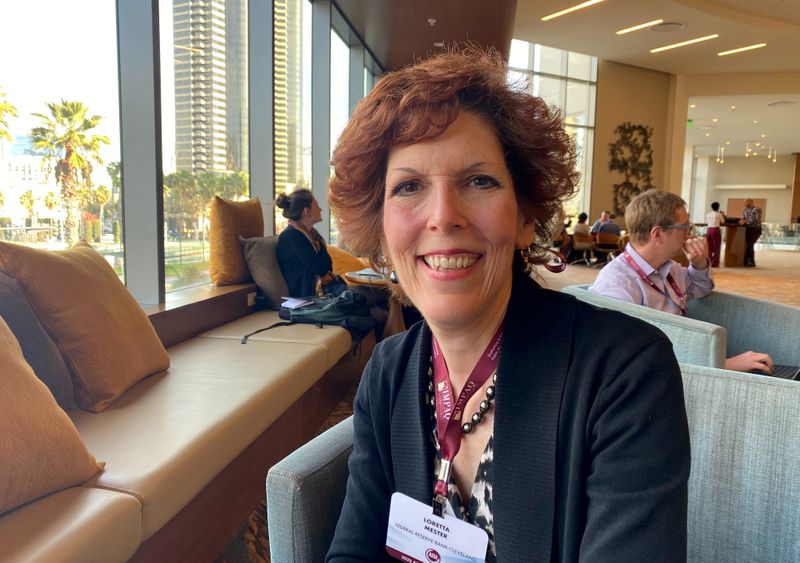By Ann Saphir and Howard Schneider
(Reuters) -A pair of Federal Reserve policymakers on Friday said they felt the U.S. economy is already in good enough shape for the central bank to begin to withdraw support for the economy, setting up for the next big Fed debates: when to raise interest rates and what to do with the Fed's massive balance sheet.
In separate appearances, Cleveland Federal Reserve Bank President Loretta Mester and Kansas City Fed President Esther George both said that the economy had made "substantial further progress" toward the Fed's maximum employment and 2% inflation goal. That's the bar the Fed has set for beginning to taper its current $120 billion in monthly asset purchases, aimed at pushing down longer-term interest rates.
The remarks came days after Fed Chair Powell said the economy is one "decent" monthly jobs report short of meeting that threshold, allowing the Fed to begin to reduce its monthly asset purchases by the Fed's next meeting Nov. 2-3.
"I support starting to dial back our purchases in November and concluding them over the first half of next year," Mester said during an event organized by the Ohio Bankers League.
"The rationale for continuing to add to our asset holdings each month has waned," George told the American Enterprise Institute.
Both appearances took place online, underscoring the continued scourge of the coronavirus pandemic that plunged the economy into its sharpest and shortest recession last year and is still keeping labor and materials short of what's needed to sate the rising demand for both as the economy recovers.
That's led to inflation above the Fed's 2% goal that policymakers like Mester and George worry could become persistent.
UNVEILING THE DEBATE
The comments from the two hawkish policymakers begin to unveil some contours of the debate that took place behind closed doors at this week's Fed policy meeting.
More Fed policymakers are due to address the issue next week, including Chicago Fed President Charles Evans and Fed Governor Lael Brainard on Monday, who have had a more dovish stance on policy, as well as New York Fed President John Williams.
Fed policymakers do not believe the bar for raising the short-term policy rate has yet been met, but half - including Mester - believe it will have been by the end of next year. Those conditions include that inflation is durably at the central bank's 2% target and that maximum employment has been reached.
Mester said monetary policy will remain accommodative even after the Fed trims its bond buying because it will still be adding to the balance sheet.
George, for her part, flagged the complications the $8.5 trillion balance sheet poses for the path of interest rates.
The accommodation from those massive asset holdings "will persist even when tapering is complete," George said. Noting her longstanding worry that keeping interest rates near zero risks both inflation and financial instability, she said, "I don't want to be lower any longer than we need to be."
After the 2007 to 2009 financial crisis, the Fed waited a year between the end of its bond "taper" and the first increase of its policy interest rate. It was two more years before the Fed began allowing the balance sheet - at the time about half its current size - to shrink.
The process may happen faster this time, with the taper not expected to end until the middle of next year and policymakers now pointing to a rate hike later that year.
Finding the right level for the policy rate given the continued stimulative effects of the balance sheet will be a challenge, George said.
"Where along the yield curve would we prefer the most policy space?" George said, conjecturing the Fed might want to keep longer-term rates low by keeping its balance sheet large, but counter that stimulus with a higher short-term policy rate.That, however, might raise the risk of an inverted yield curve, she said, an argument for shrinking the balance sheet "or at least shifting toward one with shorter-maturity assets, with a lower neutral policy rate."
"As the economy recovers from this pandemic shock, its path is likely to confound our assumptions about what a return to normal might look like," George said. "The same is true for the monetary policy normalization process. Both point to a long and difficult process ahead."
